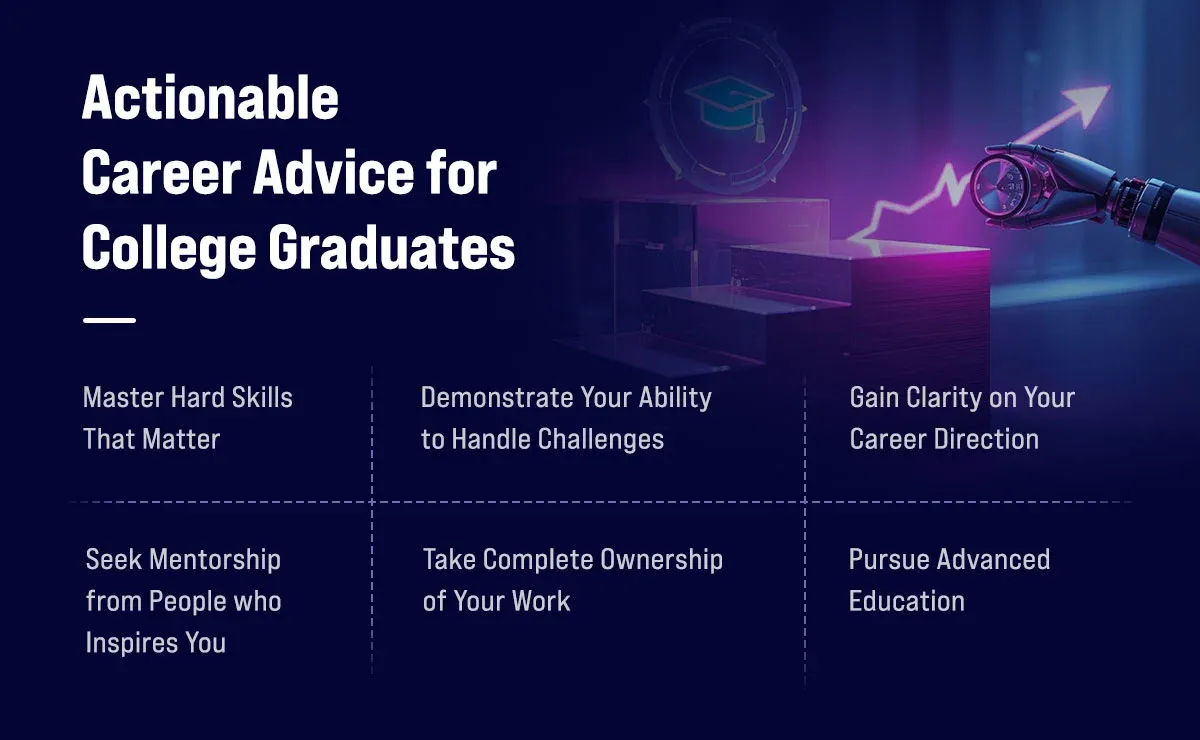What is the Best Career Advice for College Graduates?

Graduation signals the start of your career path, yet in today’s fierce job market, a standalone degree no longer suffices. Unemployment has risen to 5.6% in May 2025, up from 4.20% in 2024. At the same time, less than half of new college graduates (only 42.6%) are considered job-ready, according to The Economic Times. This means students need to plan carefully and work hard to successfully move from college to their first job.
If you are graduating in the next few months or have just received your degree, this guide outlines the essential steps to transform your academic achievement into career success.
The Current Job Market Reality
India's employment landscape is rapidly evolving, driven by three key trends that directly impact new graduates:

- Technology-Driven Growth: India's tech and startup ecosystem continues expanding, with AI and machine learning roles surging 25% year-on-year. ML engineer positions alone jumped 88%, highlighting the premium placed on specialized digital skills.
- The Skills Gap Challenge: Despite economic growth, many graduates lack job-ready capabilities. This creates a paradox where educated youth struggle to find employment despite available opportunities.
- Skills-First Hiring: The World Economic Forum reports that 30% of Indian companies plan to eliminate degree requirements, prioritizing demonstrated abilities over academic credentials.
For recent graduates, this means success depends on displaying practical skills, adaptability, and continuous learning rather than relying solely on academic achievements.
Actionable Career Advice for College Graduates
Based on the above trends, here are some of the best actionable steps that recent graduates should consider, which will help transform their career aspirations into tangible opportunities.

1) Master Hard Skills That Matter
Hard skills are your confirmed ticket to get into today's job market. They are tangible, measurable abilities that directly translate to workplace value and are what recruiters actively look for in fresh graduates. These usually cannot be learned in a day or even a week and require time and effort to master.
Technical Skills in High Demand:
- Programming: Python, JavaScript, C++, and other languages.
- Data Analysis: Excel mastery, statistical analysis, data visualization tools.
- Engineering Design: CAD software, technical drawing, project management tools.
- Robotics: Automation systems and mechanical design.
- Digital Marketing: SEO, social media management, content strategy, analytics.
- Financial Modeling: Excel modeling, investment analysis, risk assessment.
- Market Research: Survey design, consumer behavior analysis, competitive intelligence.
- Design: Graphic design, UI/UX, Adobe Creative Suite, Figma.
- Content Creation: Video editing, copywriting, multimedia production.
Choose any of these hard skills that align with your career interests and invest deeply in mastering them. Craft a portfolio highlighting your skills via independent ventures, freelancing, or open-source collaborations. Highlight your progress on platforms like GitHub or LinkedIn to exhibit your evolving expertise.
2) Demonstrate Your Ability to Handle Challenges
Recruiters want evidence that you can perform under pressure and deliver results. Your track record of tackling difficult tasks speaks louder than any resume statement.
Ways to Showcase Your Work Ethic:
- Academic Excellence: High grades in rigorous courses or competitive exams, especially in your chosen field.
- Competitive Success: Winning or performing well in hackathons, case competitions, and technical contests.
- Athletic Achievement: Excelling in sports demonstrates discipline, teamwork, and perseverance.
- Real-World Building: Creating web applications, contributing to open-source projects, or design portfolios.
Document these achievements with specific details (e.g., "Ranked top 5% in a 200+ participant hackathon") and highlight your role and contributions. Quantifiable results make your capabilities tangible to employers.
3) Gain Clarity on Your Career Direction
Early experimentation helps you identify where your strengths and passions converge, guiding you to make a more informed career decision. Use your remaining time in college or immediately after graduation to explore and decide.
Strategies for Career Clarity:
- Internships: Apply for internships in different functions or industries to test your interests.
- Diverse Projects: Engage in varied assignments to discern what fuels your passion versus what depletes your motivation.
- Seek Career Clarity: Connect with professionals in fields you are interested in so that you understand day-to-day realities and responsibilities.
- Industry Research: Study growth sectors, compensation trends, and long-term prospects of potential career paths.
Set short-term goals (6-12 months) and medium-term goals (3-5 years). Your first job does not define your entire career, but having direction helps you make strategic choices about opportunities, skill development, and networking focus.
4) Seek Mentorship from People who Inspire You
The people you work with early in your career significantly impact your professional development. When choosing between similar opportunities, prioritize environments where you will learn from experienced professionals.
Finding the Right Mentors:
- Industry Veterans: Seek guidance from professionals with 10+ years of experience in your field.
- Recent Success Stories: Connect with professionals 3-5 years ahead of you who have navigated similar challenges.
- Diverse Perspectives: Build relationships with mentors from diverse backgrounds, industries, and career paths.
- Leverage alumni networks: Connect with former classmates or professors to tap into their industry contacts and recommendations.
Look for mentors who demonstrate the career progression you want, share knowledge generously, and provide honest feedback. Quality mentorship often matters more than salary or company prestige in your first few roles.
5) Take Complete Ownership of Your Work
Having an ownership mindset distinguishes exceptional performers from average employees. Everything related to your projects falls within your sphere of influence, from quality execution to stakeholder coordination. Taking full responsibility for your work signals maturity, reliability, and leadership potential to employers.
Demonstrating Ownership:
- Proactivity: Foresee challenges, suggest enhancements, and implement fixes you can handle without waiting for instructions.
- Quality Focus: Deliver work that meets a high bar for quality, paying attention to details others might overlook.
- Transparent Updates: Keep stakeholders informed proactively, flag risks promptly, and present solutions alongside concerns.
- Team coordination: Build relationships with colleagues whose cooperation your projects require.
- Accountability: Take responsibility for outcomes, whether positive or negative.
When assigned any task, think beyond just completing it. Consider how it fits into larger business objectives, who else might be affected, and how you can add unexpected value. This mindset accelerates your professional growth and builds your reputation as someone who can be trusted with important responsibilities.
6) Pursue Advanced Education
While the five suggestions above form the foundation for a strong career launch, some graduates may further benefit from a postgraduate degree in their chosen field.
Consider a postgraduate degree as a strategic career investment. Students may not pursue a higher education right after graduation, but in the long run, it can provide significant advantages.
When to Consider Further Education:
- Specialized Fields: Job roles in data science, research, finance, and consulting often value advanced postgraduate degrees.
- Career Acceleration: An MBA or other specialized master's degree can fast-track leadership opportunities.
- Network Building: Postgraduate programs provide access to influential alumni networks.
- Skill Deepening: Some technical expertise requires formal academic training.
But to take this crucial decision, graduates must first:
- Research programs thoroughly, evaluating faculty expertise, placement records, and return on investment.
- Gain 1-2 years of work experience before pursuing a postgraduate education to better understand your interests.
- Consider part-time or executive programs that allow you to work while studying.
- Prepare for entrance exams (GMAT, GRE, GATE, CAT) well in advance.
Summing Up
Remember, your first job is a launching pad, not a final destination. By focusing on hard skills, demonstrating your ability to handle challenges, gaining career clarity, seeking mentorship, and taking ownership of your work, you will build a foundation for long-term professional success.
The job market may be competitive, but graduates who combine technical expertise with strong work ethics, clear direction, and genuine passion for their field will find opportunities to build meaningful careers. Start building these capabilities now, and you will be prepared to thrive in whatever professional challenges lie ahead.





